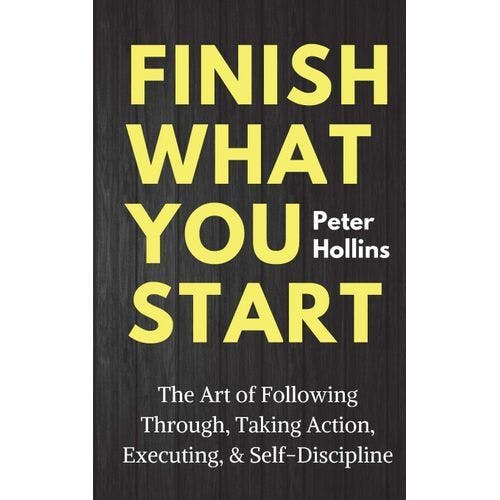 You've heard the adage: "Don't start what you can't finish." But what about the flip side? What about finishing what we start? Having a system for finishing tasks is just as important as starting them. In this article, I'll walk through five ways to make sure you actually finish what you want to do.
You've heard the adage: "Don't start what you can't finish." But what about the flip side? What about finishing what we start? Having a system for finishing tasks is just as important as starting them. In this article, I'll walk through five ways to make sure you actually finish what you want to do.
Fix your motivation
Identify your motivation
Set a goal and break it down into smaller goals
Make sure your motivation is consistent with your goals
Make sure you are motivated to do something that is not too hard or too easy
Stop thinking and start doing
Stop thinking and start doing. That's right, just do it!
Don't worry about how it will turn out. Don't think, "What if they don't like me?" or "What if they think I'm stupid?" Just get into action and try to finish what you started.
Set goals and keep them
The most important thing to remember when setting goals is that they must be measurable, achievable, relevant, and time-bound. Goals should also be specific, realistic, and flexible. Remember that your goal can be changed if it is not working out in the way you had intended.
For example: Let’s say you want to write a book of poems about your life experiences. Your goal would need to be specific and realistic as well as flexible enough so that if one approach doesn't work out for you then another path can still lead toward success with your book project.
Have a system to get stuff done
A system is an organized way of doing things. Your system will help you get stuff done, so it's important that it's easy to use, reliable, and flexible enough to be customized to fit your needs. There are lots of ways to get a system set up:
Use a calendar. A calendar makes it easy to see what's coming up in the near future and plan accordingly. If you're prone to procrastination or have trouble remembering appointments without a visual reminder (or if you just want more control over when certain tasks should happen), then having one good place where all of your appointment information is stored will make staying on top of things a lot easier for you.
Use a to-do list app/program or paper planner (or both). A great way for people who prefer lists over calendars is by using an app like Any Plan To Do List or Inbox Zero Planner (available on the App Store) or even just pen and paper—and if there are other people involved in the project with whom you'd like better communication (such as co-workers), then adding them into your planning process can only be helpful!
Learn to say no
You can do this by learning to say no. It’s important that you know when to say no. You don’t want to over commit yourself and find yourself stretched too thin and unable to finish the things that are important for you, or even just accomplish what is on your list for the day.
It’s also ok to say no if it doesn’t interest you or if it will be a waste of time for all parties involved. If someone asks you if they can borrow something from your home, and you know that they won't take care of it properly, then let them borrow something else instead!
There are many things we can do to improve our ability to fininsh what we start.
There are many things we can do to improve our ability to fininsh what we start. It all starts with fixing our motivation.
We need to stop thinking and start doing. It's not just about setting goals, it's also about following through on them with action!
Set up a system that works for you, so that you're always on track of getting things done at the pace that makes sense for your life and situation (and don't be afraid of changing it as things evolve over time).
Conclusion
There are many things we can do to improve our ability to fininsh what we start.

